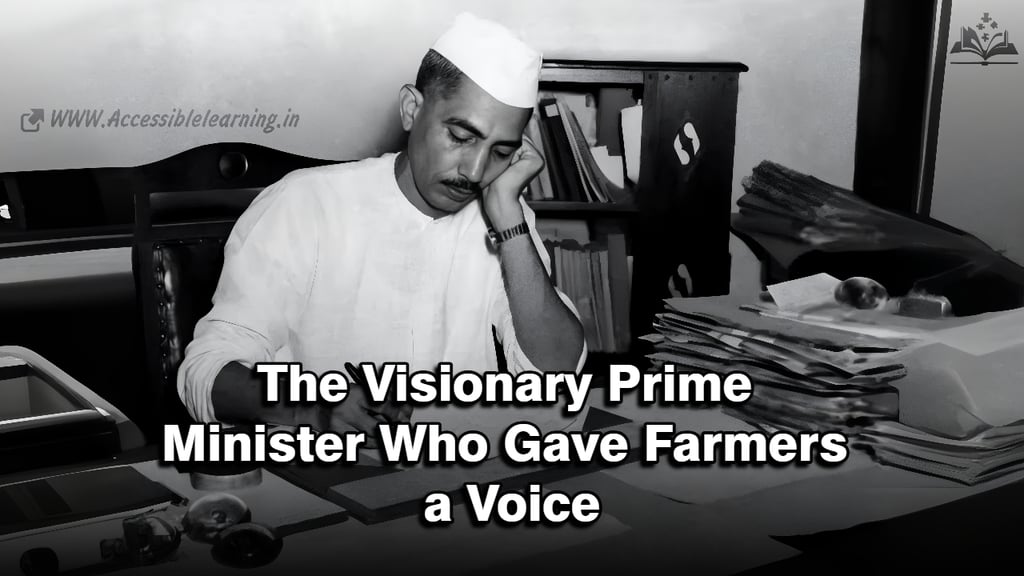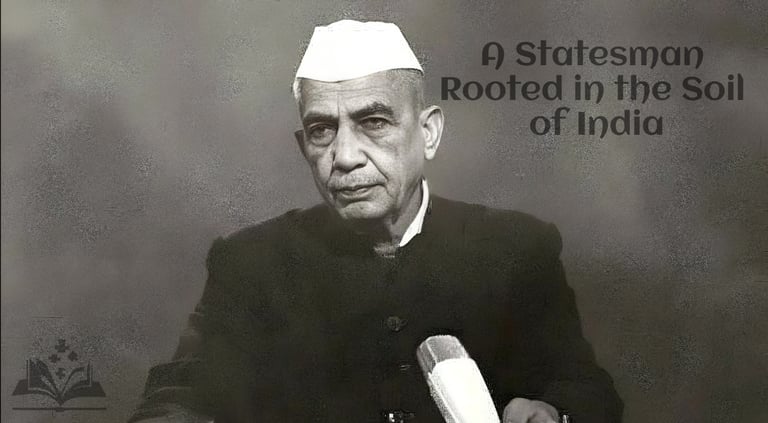
A Leader of the Land: The Life of Chaudhary Charan Singh!
Explore the life and legacy of Chaudhary Charan Singh Ji, India's 5th Prime Minister and the revered 'Champion of Farmers.' This in-depth article highlights his contributions to agrarian reforms, rural empowerment, and socio-economic equity, offering valuable insights into his enduring impact on India’s development.
THE GREAT LEADERINDIAN HISTORYBIOGRAPHYPOLITICAL JOURNEYHISTORY
Sachin K Chaurasiya
12/22/20245 min read


Chaudhary Charan Singh (चौधरी चरण सिंह) Ji, fondly remembered as the "Champion of Farmers (किसानों के चैंपियन)," was a pivotal figure in Indian politics and one of the most prominent leaders who shaped the socio-economic fabric of rural India. As an ardent advocate for agrarian reforms and a staunch proponent of rural development, his legacy resonates deeply with the aspirations of millions of farmers across the nation. This article delves into the life, contributions, and enduring influence of Chaudhary Charan Singh, whose ideals continue to inspire generations.
Early Life & Education!
Born on December 23, 1902, in a humble peasant family in the village of Noorpur, Meerut (in present-day Uttar Pradesh), Chaudhary Charan Singh Ji's early life was deeply rooted in rural traditions and values. His father, Chaudhary Mir Singh (चौधरी मीर सिंह), emphasized education despite limited resources, enabling young Charan Singh to excel academically.
He pursued his higher education at Agra University, earning a Master’s degree in arts followed by a law degree. This academic foundation provided him with the tools to analyze and critique the socio-economic disparities prevalent in colonial India, particularly those affecting farmers.
Chaudhary Charan Singh’s early exposure to the struggles of rural life instilled in him a lifelong commitment to improving the lives of farmers. He was deeply influenced by the works of Mahatma Gandhi and Swami Dayanand Saraswati, both of whom emphasized simplicity, self-reliance, and community service.
Political Journey and Vision!
Chaudhary Charan Singh's (चौधरी चरण सिंह) political career began in the pre-independence era when he joined the Indian National Congress in 1929. Inspired by Mahatma Gandhi's philosophy, he actively participated in the freedom struggle, particularly the Civil Disobedience Movement. However, his core focus remained on issues affecting rural India, such as land redistribution, fair tenancy rights, and the abolition of exploitative zamindari systems.
Postindependence, Chaudhary Charan Singh emerged as a towering leader in Uttar Pradesh politics. His seminal contributions included drafting and implementing the Zamindari Abolition and Land Reforms Act of 1951, which dismantled the feudal landholding system and redistributed land to the landless. This was a revolutionary step toward empowering marginalized communities.
As the Chief Minister of Uttar Pradesh (1954-1956 and 1967-1968), he prioritized agrarian development and village-centric policies. His measures improved irrigation facilities, enhanced rural credit systems, and protected small-scale farmers from the burden of heavy taxation. He also advocated for cooperative farming to ensure collective prosperity among small landholders.


Leadership & Prime Ministerial Tenure!
Chaudhary Charan Singh Ji's political philosophy was rooted in Gandhian principles and a firm belief in empowering the agrarian community. His differences with the Congress leadership over policies favoring industrialization over agriculture led him to part ways with the party. In 1967, he formed the Bharatiya Kranti Dal (भारतीय क्रांति दल), a platform dedicated to rural empowerment.
In 1977, he played a key role in the formation of the Janata Party, which emerged as a unifying force against the authoritarian tendencies of the Emergency imposed by Indira Gandhi. Chaudhary Charan Singh’s leadership was instrumental in shaping the party’s pro-farmer stance and decentralization policies.
On July 28, 1979, Chaudhary Charan Singh became the 5th Prime Minister of India, albeit for a brief tenure of just over six months. Despite the short duration, his leadership underscored his commitment to farmers and rural development. He introduced policies aimed at improving credit access for farmers, enhancing irrigation infrastructure, and advocating for fair pricing of agricultural produce.
One of the hallmarks of his tenure was his emphasis on protecting the interests of the peasantry over urban-industrial elites, which won him widespread respect among rural constituencies but also led to political opposition from industrial lobbies.

The Farmer’s Advocate!
Chaudhary Charan Singh Ji's most enduring contribution was his ability to give farmers a political voice. He recognized that India’s economy was fundamentally agrarian and that rural prosperity was essential for national progress. His writings, such as "Abolition of Zamindari (जमींदारी उन्मूलन)" and "India’s Poverty and Its Solution," articulated his vision for an equitable society where farmers were not just producers but active participants in the nation’s economic growth.
He was instrumental in the creation of Kisan Unions (farmer unions) and inspired several farmer movements that demanded policy reforms to address rural distress. His legacy as a farmers’ leader earned him the affectionate title of "Kisan Leader (किसान नेता)" (Leader of Farmers).
Chaudhary Charan Singh’s deep understanding of rural issues was also reflected in his advocacy for cooperatives and self-sufficient village economies. He believed that India’s true progress lay in strengthening its villages, a belief deeply resonant with Mahatma Gandhi’s philosophy of "Gram Swaraj/ग्राम स्वराज" (village self-rule).
He also played a crucial role in empowering women in rural areas, emphasizing the need for their active participation in economic and social decision-making processes. His advocacy for education and healthcare in villages underscored his holistic approach to rural development.
Legacy & Commemoration
Chaudhary Charan Singh Ji passed away on May 29, 1987, but his legacy continues to inspire millions. In his honor, National Farmers' Day (Kisan Diwas/किसान दिवस) is celebrated annually on his birth anniversary, December 23, to recognize the invaluable contributions of farmers to India's economy.
Several institutions and landmarks bear his name, such as the Chaudhary Charan Singh International Airport in Lucknow and Chaudhary Charan Singh University in Meerut, serving as lasting tributes to his vision and leadership. His vision for rural development has influenced numerous government policies, including loan waivers for farmers, minimum support price schemes, and rural employment programs.
Beyond the infrastructural tributes, Chaudhary Charan Singh's ideals are preserved in the political discourse surrounding agricultural reforms. His advocacy for fair market prices and land rights continues to resonate with policymakers and farmer leaders alike.
Values & Relevance Today
Chaudhary Charan Singh Ji’s emphasis on agriculture, decentralization, and rural upliftment remains highly relevant in contemporary India. Amid rising farmer agitations and debates over agrarian policies, his vision provides a guiding light for equitable and inclusive development. His insights into the plight of farmers and rural India resonate in modern policy discourses, including discussions around sustainable agriculture, water conservation, and rural infrastructure development.
Beyond policy, his personal integrity and simple lifestyle stand as an example of ethical governance. Known for his humility, he often stated that he considered himself a servant of the farmers rather than a political leader. This humility and dedication earned him the enduring respect of millions.
Chaudhary Charan Singh’s Philosophy on Modern India!
He firmly believed that industrialization, while necessary, should not come at the expense of rural communities. He advocated for a balanced approach where rural and urban development complemented each other. His emphasis on small-scale industries and local entrepreneurship as a means to generate employment remains a cornerstone for inclusive economic policies.
His political philosophy also rejected excessive centralization. He argued that true democracy could only thrive when local governments were empowered and decision-making processes were decentralized. This belief paved the way for several Panchayati Raj/कई पंचायती राज (village governance) reforms in India.


Chaudhary Charan Singh/चौधरी चरण सिंह Ji was more than a politician; he was a statesman who lived and breathed the struggles of rural India. His unwavering commitment to farmers and his vision for a self-reliant, agrarian-based economy reflect his profound understanding of India’s socio-economic fabric. As India continues its journey toward modernization, the principles espoused by Chaudhary Charan Singh serve as a timeless reminder of the importance of balancing development with social equity.
In honoring his memory, we also honor the countless farmers who form the backbone of the nation, embodying the values of perseverance, resilience, and hope. His life’s work remains a beacon for those striving for a just and prosperous society that leaves no one behind.
His vision also calls for renewed focus on sustainable farming practices, environmental conservation, and climate resilience, ensuring that rural communities can thrive amid the challenges of a changing world.
Subscribe To Our Newsletter
All © Copyright reserved by Accessible-Learning Hub
| Terms & Conditions
Knowledge is power. Learn with Us. 📚


